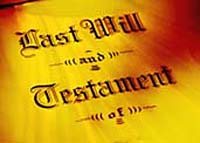 You won’t know if the will accomplished what you wanted or not, but your heirs will be the ones cleaning up the mess left behind. Could fixing DIY wills become a new practice area for attorneys?
You won’t know if the will accomplished what you wanted or not, but your heirs will be the ones cleaning up the mess left behind. Could fixing DIY wills become a new practice area for attorneys?
As is often reported, most Americans—66%—don’t have a written will. They put it off, thinking they’ll get around to it. Only 30% of Americans age 45-54 have a will, while 46% of seniors age 55-64 do have a will. If you have no children and no assets, and don’t care what happens to your property, then maybe you don’t need a will. But if you have children, assets and don’t want a court deciding what happens to your property, it’s best to have a will.
In the article “4 Things You Should Know Before You Make Your Own Will,” Money points out that the definition of “closest blood relative” and the procedure of dividing your assets can vary significantly by state. So if you have some ideas as to where your assets should go, it’s worth the time and effort to develop a plan in writing. Sure, you can give it a go with a Do-It-Yourself. If you die without a will, it won’t matter what you wanted.
If you’re going to try the DIY route, you need to understand your state laws, such as the fact that in some states, a handwritten will may not require any witnesses. Only half of states accept these wills as legally binding. On the other hand, a newly typed will requires two witnesses’ signatures to be valid just about everywhere. However, an older typed will that was executed in a state like Vermont or Georgia, which used to require three witnesses, will be subject to the old requirements unless it’s updated. Starting to get a little complicated, yes?
You should also be aware of any state estate or inheritance tax. If your state has this, you need to prepare for it. About a half a dozen states impose an inheritance tax—that means your heirs who live in that state will have to pay. Another 12 states impose an estate tax, which gets paid on your overall assets (in addition to the federal estate tax).
A will doesn’t cover all of your assets. Anything in joint name or payable to a named beneficiary, like life insurance policies or 401(k)s, is outside the control of a will. You can create transfer-on-death or payable-on-death designations for checking, savings, and money market accounts; certificates of deposit; and U.S. bonds.
Once you’ve taken care of these items, you need to write out your intentions. Make sure you use the right language, like spelling out who you are and the purpose of the document. You should also be specific, like including full addresses when identifying the property and a complete description of personal property. In addition, use the full names of beneficiaries, not “my wife” or “my child.”
You also need to designate an executor you trust and let him or her know where to find your will. Name a secondary executor or a co-executor in the event that your first choice can’t carry out the task or predeceases you. Along those same lines, appoint a guardian for minor children.
Finally, the most difficult aspect of a DIY will is trying to think of all the contingencies. That’s where an estate planning attorney can really help you. While a handwritten will won’t cost you a penny, in most states, a will drafted by an attorney can cost a few hundred dollars. Think about this especially if you have a larger, more complex estate. There are important federal estate tax considerations.
Having a will properly prepared by an estate planning attorney will serve several purposes. It will save your heirs considerable hassle, headaches and heartache. If you have beneficiaries that would not be heirs based on your state’s intestacy statutes, you need a will to protect them. If surviving family members or friends are not the designated successors, you may be putting them in the position of having to spend thousands or far more to fight for what you wanted them to have.
All too often, the do-it-yourself will becomes the most expensive will of all.
Don't DIY! Save your spouse and children a lot of time and hassle by hiring a professional. Contact Legacy Counsellors, P.C. today for a customized estate plan. (413) 527-0517
Reference: Money (August 17, 2016) “4 Things You Should Know Before You Make Your Own Will”
